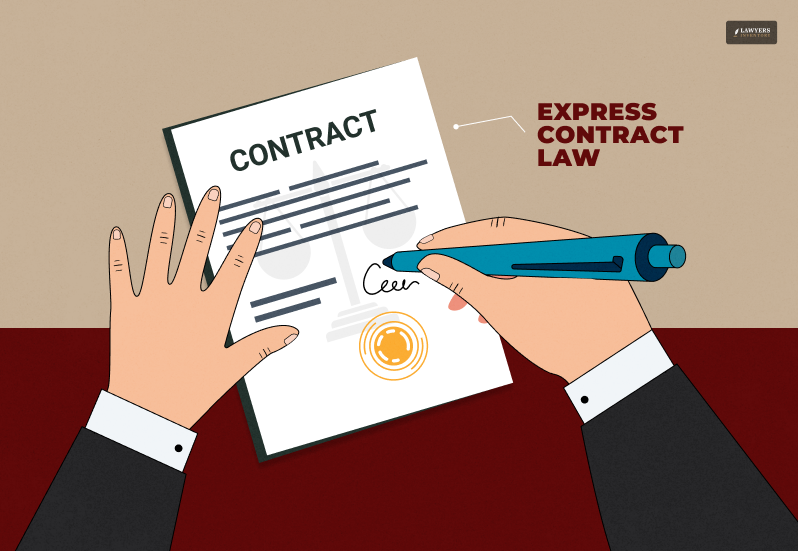
When it comes to making deals or agreements, having a clear understanding of the terms is crucial. That’s where express contract law comes in.
In simple terms, an express contract is a straightforward agreement where both parties clearly outline the terms, obligations, and expectations. It’s like having a roadmap for your deal, ensuring everyone is on the same page.
Express contracts are essential in business and personal transactions, providing clarity and protection for all parties involved. But when should you use an express contract? And what are the benefits?
In this article, I will break down the ins and outs of express contract law, helping you navigate the world of agreements with confidence.
Therefore, whether you’re a business owner, entrepreneur, or just looking to make a deal, understanding express contracts is key to avoiding misunderstandings and disputes.
So, keep on reading this blog till the end to learn more…
Understanding Express Contract Law
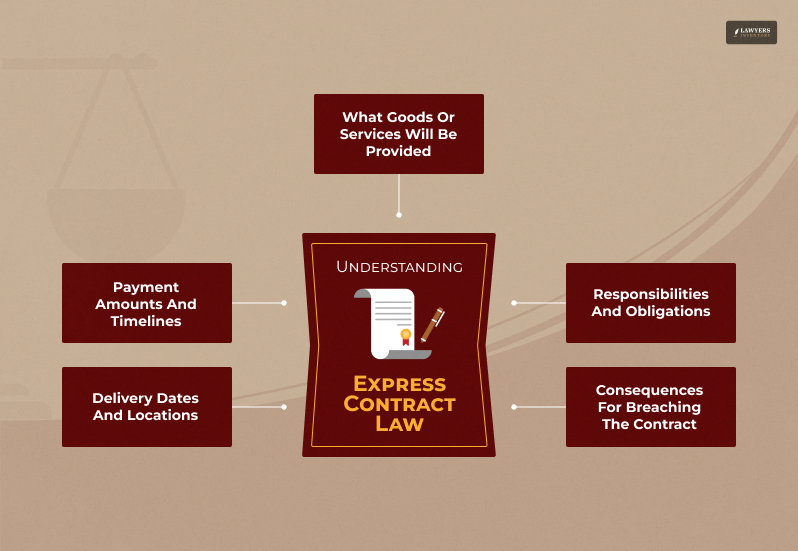
Express contract law is a type of contract where all the terms, obligations, and expectations are clearly stated and agreed upon by both parties.
It’s a straightforward and explicit agreement that leaves no room for misunderstandings. Think of it like a blueprint for your deal, outlining exactly what each party promises to do or provide.
In an express contract, the terms are stated explicitly. These can be either written or verbal.
This includes details like what goods or services will be provided, payment amounts and timelines, delivery dates and locations, responsibilities and obligations, and consequences for breaching the contract.
Having a clear and explicit agreement helps prevent disputes and ensures both parties are on the same page.
Express contracts can be used in various situations, such as sales contracts, business agreements, employment contracts, and real estate transactions.
The benefits of express contracts include clarity and certainty, reduced risk of misunderstandings, protection for both parties and ease of enforcement.
What are the Elements of an Express Contract Law
Like any other situation where there are elements of the contract, there are several elements that act as the foundation or the building blocks of the express contract.
These key elements work together to create a clear and binding agreement. Additionally, these elements ensure that both parties understand their roles, responsibilities, and expectations.
By including these essential elements, express contracts provide a solid foundation for agreements, protecting both parties and ensuring a smooth transaction.
So, what are these? Well, they are not very different from other elements of contract law/ They are as follows:
- Offer and Acceptance: The first two elements are the offer and acceptance. One party makes a clear and specific offer, and the other party accepts it exactly as presented. This exchange creates a mutual understanding of the terms.
- Consideration: Consideration is the value exchanged between parties. It can be money, goods, services, or a promise to do something. Both parties must provide something of value to make the contract valid.
- Capacity: Capacity refers to the ability of both parties to enter into a contract. This means they must be of legal age, have a sound mind, and not be under duress or coercion.
- Legality: The contract must be for legal purposes. If the agreement involves something illegal, it’s not enforceable.
- Intent: Both parties must intend to create a binding agreement. This means they understand the terms and agree to be bound by them.
- Writing: While not always necessary, writing down the contract helps prevent misunderstandings and provides evidence of the agreement.
When Should You Get an Express Contract Law
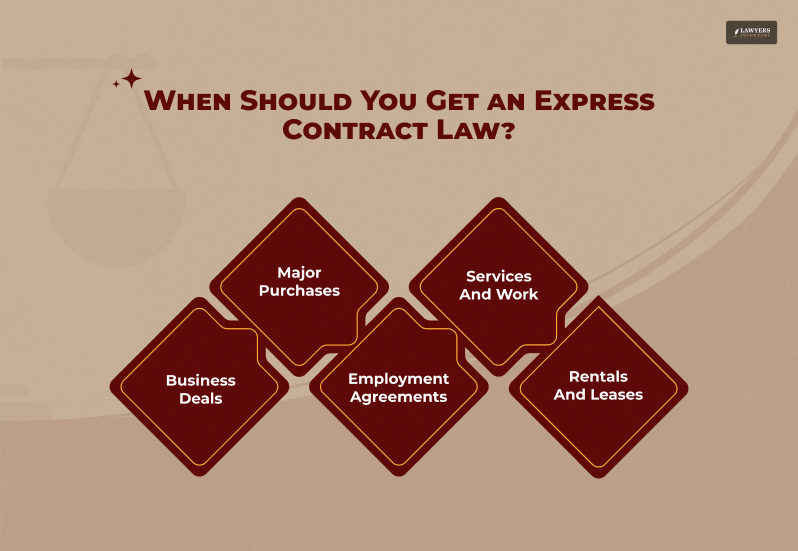
So, now that you are aware of what an express contract law is, it is time to know when to get it.
In general, consider getting an express contract whenever you’re making a significant commitment, investment, or agreement. It provides a clear understanding of the terms, protects your interests, and prevents potential disputes.
You should consider getting an express contract in various situations to protect your interests and ensure clarity. Here are some situations where an express contract is essential:
1. Business Deals
Firstly, an express contract is crucial when entering into business partnerships or agreements. It clearly outlines the terms, roles, and expectations of each party. This includes details like:
- Ownership and control
- Profit sharing and financial obligations
- Responsibilities and decision-making processes
- Exit strategies and termination clauses
Having a clear idea of the clauses of the contract prevents misunderstandings, protects your interests, and ensures a smooth partnership. For significant purchases like real estate, vehicles, or equipment, an express contract ensures you understand the terms, conditions, and warranties.
2. Major Purchases
Secondly, an express contract is essential when making significant purchases, like real estate, vehicles, or equipment.
This type of contract ensures that you have a clear understanding of the terms, conditions, and warranties associated with your purchase.
The contract should include important details such as the price and payment terms, delivery and installation procedures, warranty and maintenance requirements, and return and refund policies.
By having all of this information in writing, you can protect your investment and avoid costly misunderstandings.
Don’t risk losing money or time due to a lack of clarity – get an express contract for your major purchases. This simple step can provide peace of mind and ensure a smooth transaction.
3. Employment Agreements
An employment agreement is a type of express contract that outlines the terms of employment. Besides, this agreement is essential to clearly define the role, responsibilities, and expectations of both the employee and employer.
The employment agreement should include important details such as job responsibilities and duties, salary, benefits, bonuses, work schedule and leave policies, and termination conditions and notice periods.
Moreover, by writing all of this information, both parties can understand their obligations and avoid potential misunderstandings.
Having a clear employment agreement ensures a smooth working relationship and prevents disputes.
Thus, it’s a crucial step in establishing a positive and productive employer-employee relationship.
4. Services and Work
When hiring contractors or freelancers, an express contract is necessary. It defines the scope of work, including tasks, timelines, and deliverables.
Furthermore, this contract also outlines payment terms, deadlines, and expectations. Having a clear agreement ensures both parties understand their roles and responsibilities.
5. Rentals and Leases
Lastly, when renting or leasing a property, a clear and detailed contract is vital. This agreement, also known as a rental or lease agreement, outlines the landlord’s and tenant’s rights and responsibilities.
It covers essential details such as:
- The amount of rent and how it’s paid
- How long does the lease last, and what options for renewal
- Who’s responsible for maintaining and repairing the property
- How can the agreement be ended, and what are the required notice periods
Having a comprehensive contract in place helps prevent misunderstandings and disputes, ensuring a harmonious and peaceful living or working environment for all parties involved.
Express Vs. Implied: Know the Difference
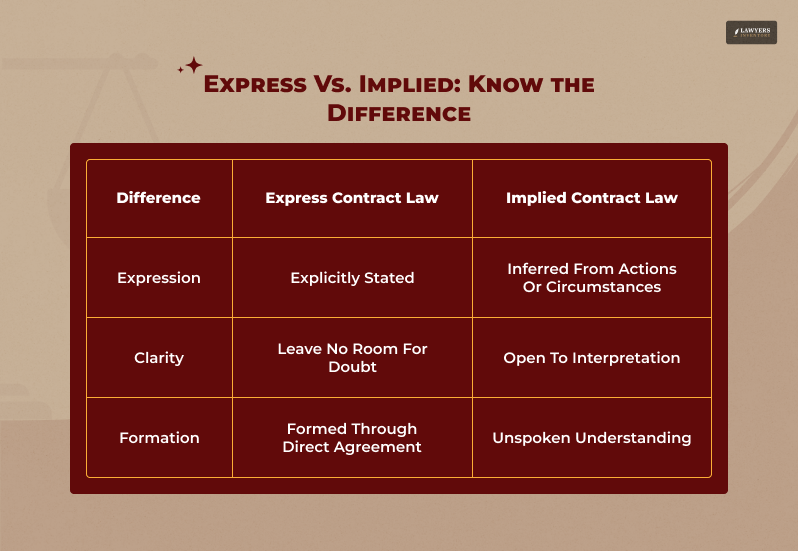
There are two main types of contracts: express contracts and implied contracts. The key difference between them lies in how they are formed and communicated.
An express contract is a clear and direct agreement between two parties. It’s typically written down or verbally stated, with both parties explicitly agreeing to the terms.
This type of contract leaves no room for doubt or misinterpretation. For example, when you buy a car, you sign a sales contract outlining the price, features, and warranty.
An implied contract, on the other hand, is an unspoken understanding between parties. It’s not explicitly stated but is inferred from their actions, circumstances, or previous dealings.
Implied contracts often arise from everyday situations, like when you visit a doctor or hire a plumber. Thus, there’s an implied agreement that you’ll pay for their services in these cases.
In summary, express contracts provide clear and direct agreements, whereas implied contracts rely on unspoken understanding.
Additionally, both types of contracts have their place in everyday life, and understanding their differences can help you confidently navigate various situations.
Wrapping It Up!
In summary, express contract law provides a solid foundation for any agreement, ensuring a smooth and successful transaction.
By being clear and explicit, you can avoid potential pitfalls and focus on achieving your goals.
I hope that this blog has been of help to you. If you have any other queries related to this, please feel free to let me know.
All you need to do is scroll down until you reach the page’s bottom. Then, leave your queries in the box below. And I will be there to answer them all for you.
Read More:
- All You Need To Know About Contract Repository
- Who Is An Energy Lawyer? How Can You Find One?
- All You Need To Know About Procurement Contracts








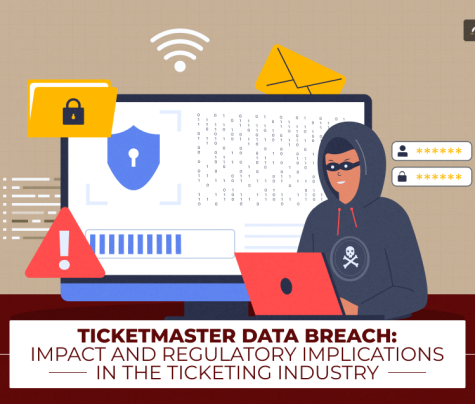

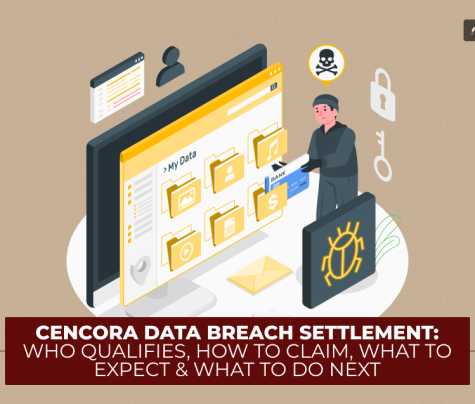
0 Reply
No comments yet.